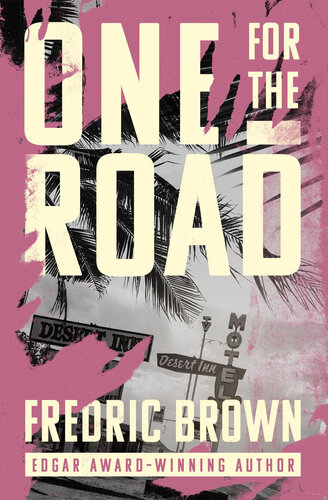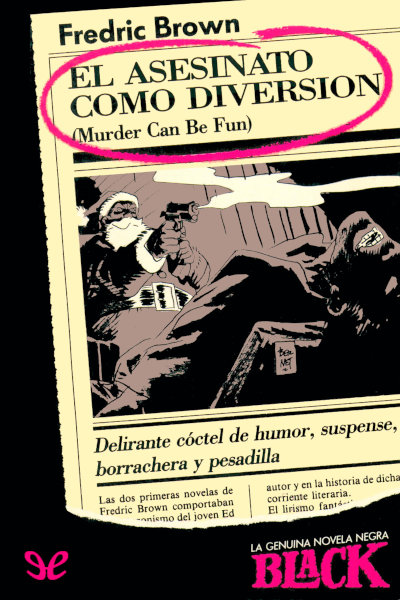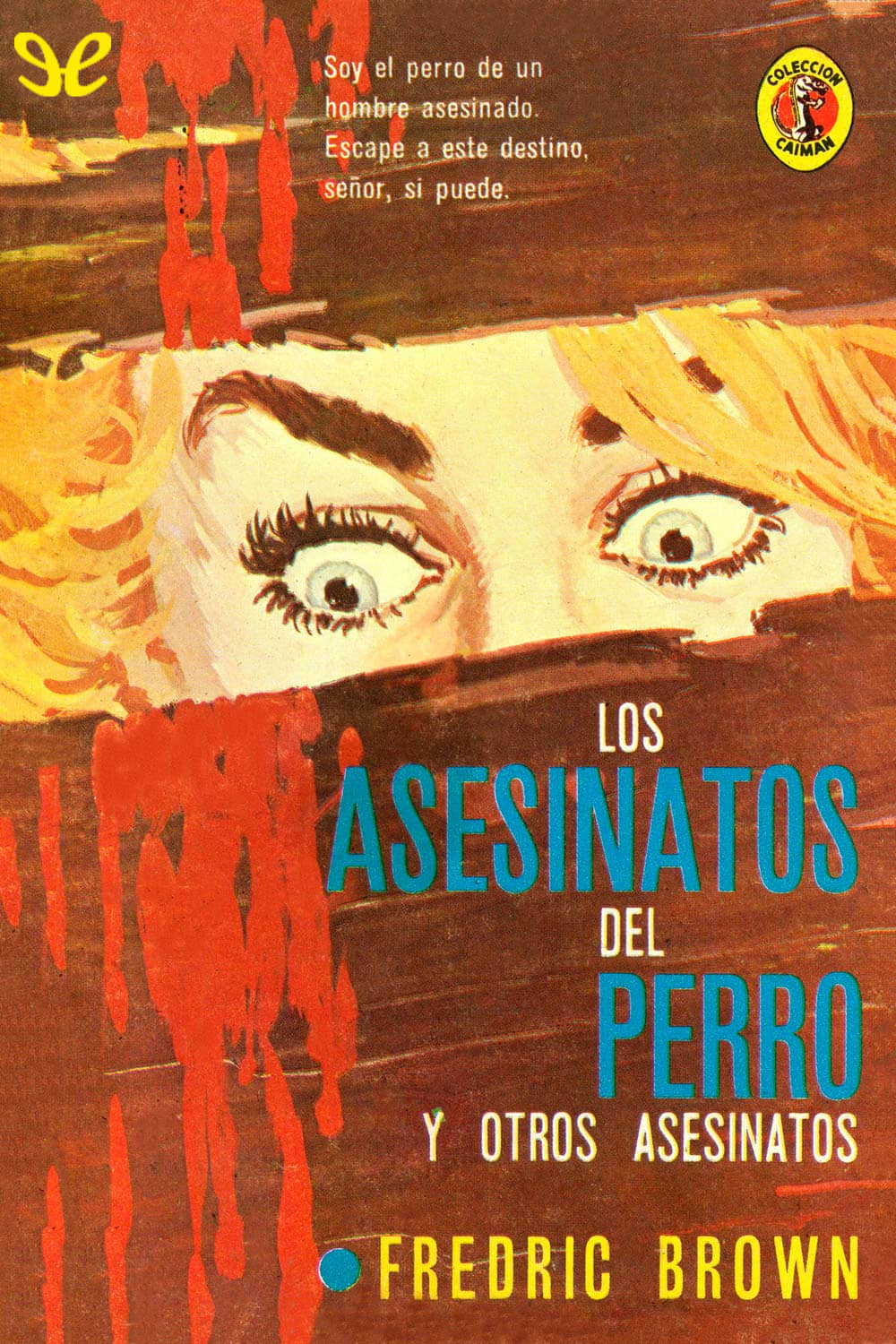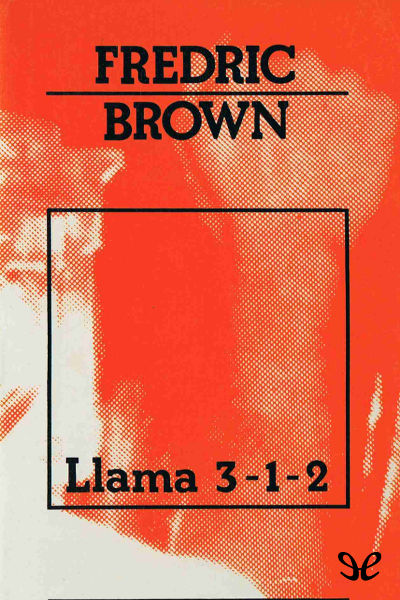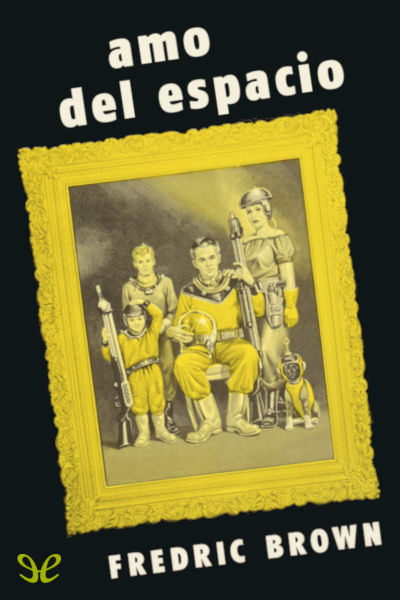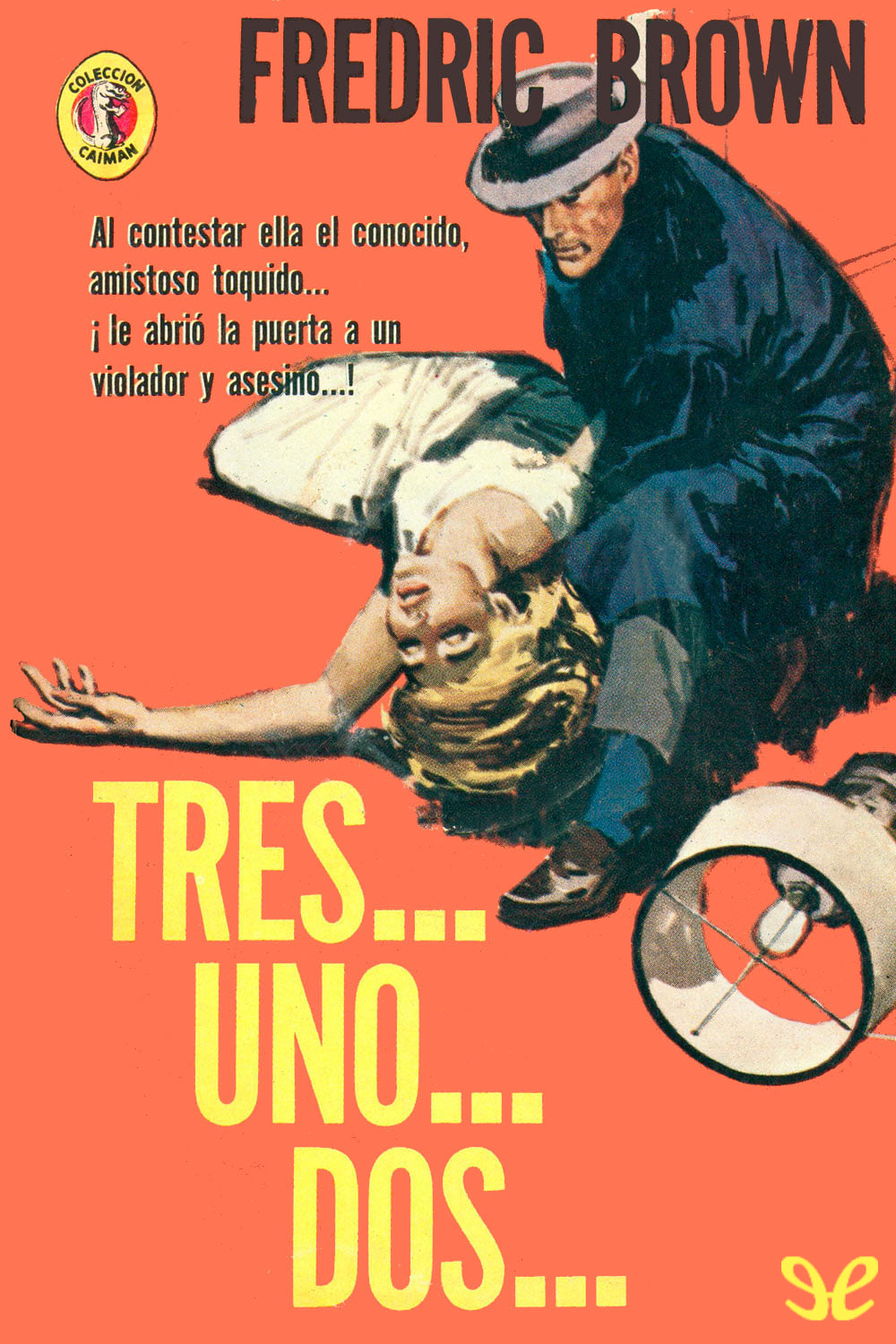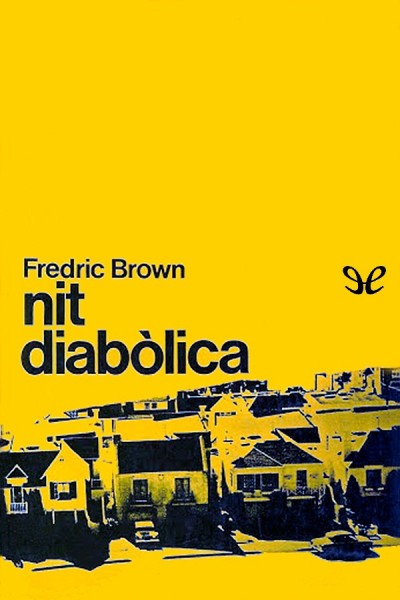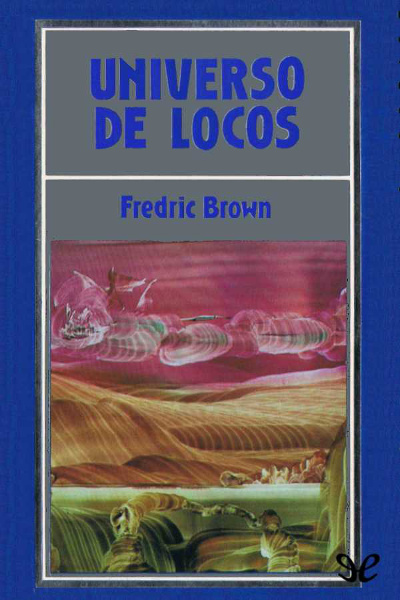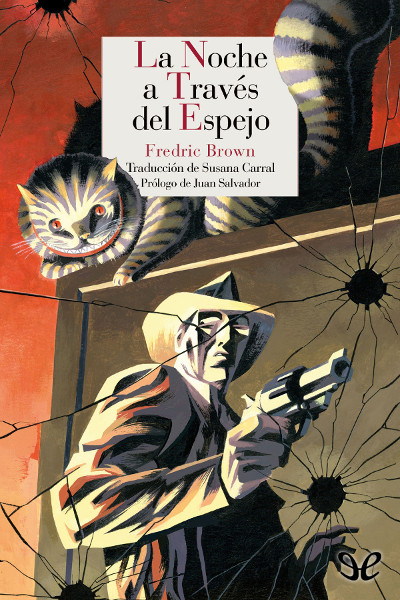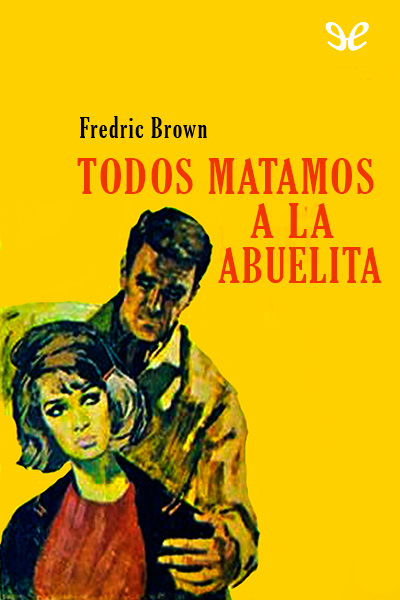oleebook.com
Lembranzida fabulosa de Fredric Brown
de Fredric Brown - Género: Policial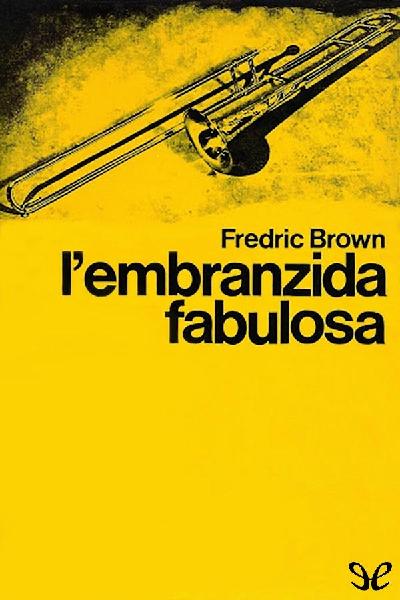
Sinopsis
Després que el seu pare hagi estat assassinat en un fosc carreró de Chicago, un noi de divuit anys, Ed Hunter, decideix, amb el seu oncle Am, dinvestigar el crim, la qual cosa el condueix no tan sols al descobriment de les veritats de la vida sinó també a una nova visió del seu progenitor i dell mateix. «Podem fer alguna cosa que no puguin fer els policies?», pregunta Ed, i el seu oncle li respon: «Ells només hi invertiran una part limitada del seu temps, si no troben pistes fresques. Nosaltres tenim tot el temps del món. Aquest és un avantatge. Posseïm alguna cosa que els manca». Daquesta manera, el temps sinfiltra a la trama com un element que resultarà essencial des de perspectives diferents i que donarà un significat calidoscòpic a aquesta novel·la brillant de tema definitivament iniciàtic.
Libros Recomendados - Relacionados
Reseñas Varias sobre este libro
Noir light
Fredric Brown is best known for his science fiction, particularly short stories. But he wrote stories and books in other genres such as the Edgar Award winning mystery THE FABULOUS CLIP JOINT. Published in book form in 1947, it was first published in Mystery Book Magazine, April, 1946 as Dead Man's Indemnity.
Brown, who had honed his craft by publishing hundreds of short stories in the pulp magazines of the day was known for interesting and sometimes humorous twists. The FABULOUS CLIP JOINT definitely has several twists but light noir not humor. Well, some very light sardonic humor. It was the first of seven novels featuring the nephew/uncle team of Ed and Am Hunter. A type setter and apprentice printer teamed with a carney who, perhaps improbably, make a heck of a team.32 s2 comments EdAuthor 54 books2,705
I've heard lots of terrific things about Fredric Brown, and I've read a couple of his short stories in anthologies. The Fabulous Clipjoint is my first novel, and I gave it five stars because I'm a sucker for old-school private eye yarns this one is. Plus anything with jazz in it gets bonus points. Mr. Brown won the 1948 Edgar for Best First Novel in what went on to become a series, I'm told by other reader (I know the late Ed Hoch told me he was a big Fredric Brown fan).
Ed Hunter, still a teenager, works as a printer apprentice in Chicago and finds his father has been murdered. Before long, Ed hooks up with his Uncle Am, a carney who also happens to have some private investigator professional experience. Together, they set out to expose the killer with a little help given by the cops. Sounds pretty standard PI fare except we're also treated to young Ed learning about life and coming of age. He encounters bank robbers, gun molls, torpedos, and con artists. All of it is related in his even-tempered, engaging voice. That for me is the strength of the novel.
I wouldn't call The Fabulous Clipjoint hardboiled, more medium-boiled. Besides the snappy title, the story is first-rate. If I ever find more time to read, I'd move on in the series and find out just what the heck happens to Ed and Uncle Am. 22 s Jamie1,282 164
3.5 stars. A fairly simple plot and storytelling, yet Brown successfully captures some of the boyish exhilarations and determination of a young man on the trail of his father's murderer, forced to grow up practically overnight. This felt a bit more a golden age mystery from the 20's or 30's rather than the hardboiled noir I was expecting, though Brown does manage to slip in a few unexpectedly lurid scenes, even by today's standards.21 s Tim Orfanos353 37
To ???????????? ?????????? '?????' ??????????? ??? Brown ???????? ??? ??????????? ???????? ??? ????? ??? ????? ?????? ??? ?????????? ???: o ?????? ??????? ????? ???, ??? ?????? ???? ?? ??? ???? ???, ?????? ??? ????????????? ?????? ???, ??????? ??? ???? ??? ??????????? ?????????, ?? ?????? ?????? ??? ?????????? '????????' ??? ????? ??? ????????? ??? '???????????' ??????.
? ?????????? ??????? ????? ?? ???? ??? ?????????-?????????? ??? 2 '???????', ???? ? ???? ????? ??? ????? '??????' ??? ?????? ????????, ?????? ? ??????????? ??? ????????? ??????? ????????????? ??? ??????????? ??? ????????? - ?????????? ??? ????, ??????, ???????? ?? ?? ??????????? ??????? '???????' (1948) ??? ?? ???????? ????????? ????????? ??????????? ??????????????.
??????????: 3,8/5 ? 7,6/10.adventure book-awards-nominations controversial ...more17 s David558 115
For years, I was periodically coming across the name Fredric Brown. The general impression I had was one of 'vintage dime-store potboiler'. I couldn't guess the quality of his writing - and the closest I got to that was the deliciously campy 1958 screen version of 'Screaming Mimi', starring Anita Ekberg and Gypsy Rose Lee and featuring such smoldering dialogue as: "How tall are you, Yolanda?"
"With heels or without?"
"With anyone." Finding Mr. Brown on the page was daunting. His work (championed by the s of Stephen King and Philip K. Dick) proved to be either 'overpriced speciality item' stuff or out-of-print. That would indicate he was much more of his time and not all that relevant now for any reason.
~ except perhaps to those who veer toward vintage. As is apparent with Otto Penzler's American Mystery Classics series, resurrecting crime / suspense / thriller masters of days gone by. (Penzler's collection is very much worth a stroll-through.)
'The Fabulous Clipjoint' (a fabulous title left unexplained until the book's near end) is the first of a Brown series pairing the teen Ed Hunter with his carny uncle, Ambrose. A rather unly partnership - what with the huge age difference and all - but family is family and blood will tell, in terms of effective loyalty and teamwork.
Ed's dad has been murdered. But that doesn't make any sense. Sure, he's been a little different lately - ('cause his second wife isn't exactly heaven to live with?... which could explain why he's been drinking a little more...) - but who would kill him? He doesn't have any enemies to speak of. Ed can't sit with thoughts of a 'robbery gone bad'. In comes Uncle Am.
Brown's writing isn't as rollicking as I was led to believe. Overall, it was more a standard police procedural - but, for what it is, its angle is unique, its complications are sometimes surprising, and the story's construction is solid. Ain't no fat on this baby; it's a lean, prime-cut machine. 15 s Carla Remy893 104
11/2017
Very, very good. At first this reminded me of the Moon in the Gutter by David Goodis (in that one it is the beloved sister who is dead in the alley, here it's the father), but it became more plotty and interesting (I loved Uncle Ambrose talking about how everything is just atoms spinning around so, you know, reality isn't as real as you think). A satisfying book.
(Just to clarify, this came out in 1947, the Goodis is from five years later).12 s Skip3,367 531
An under-read pulp writer from the 1940s, this is a classic noir mystery set in Chicago, the first of a series featuring young Ed Hunter and his uncle Ambrose, a carnie. Ed's father is killed in an alley on the way home from a regular night out bar hopping. The detective seems unmotivated so these two set out to solve the mystery of his death. Brown does a good done, keeping the reader guessing who killed Ed's father and why. Recommended for readers who enjoyed Ed McBain's 87th Street Precinct series.
Sadly, I am not sure where I am going to find the rest of this series...award-winners e-books thriller8 s Andy Weston2,693 209
Brown is a writer Ive been meaning to get to for a while. He is highly regarded as a pulp author, but also for his flash fiction with a twist, and his science fiction. I read a particular recommendation for this by Lawrence Block, so thought Id begin with it.
The title refers to the city of Chicago, and immediately the reader is immersed in a desperate working-class of the 1940s which puts in mind the noir classic films of the day, such as The Postman Always Rings Twice, Out of the Past and Nightmare Alley.
18 year old Eds father is beaten in an alley one night, a seemingly motiveless murder. Not an admirer of his step-mother, Ed goes to his uncle Ambrose, who works in a travelling carnival, a train ride away. Ambrose is immediately suspicious of the motive, and the two team up to get some answers.
Theres so much pulp fiction that its hard to get a plot that is ingenious, but Brown has managed that here. But its the quality of his writing that hauls the reader in. Parts of the plot maybe a bit difficult to accept, but this is a coming of age story at its heart, and the attraction lies in the first person narration of Ed, and his rapid education in life on the streets at the hands of his uncle. american-literature crime mystery ...more7 s Michael423 53
By the time Fredric Brown wrote this, his first full novel, he had already been a prolific contributor to the pulp mags of the 1930s & 40s, turning in works across multiple genres from Sci-fi to Noir. The Fabulous Clipjoint duly won the Edgar Award for Best First Novel and introduced a popular pair of would be detectives, Ed & Ambrose Hunter, that would feature in a further six novels. Ed is an 18 year old living in Chicago with his father, step mother and teenage step sister. His hum drum existence as a printer working at the same firm as his father by day and dreaming of becoming a jazz musician by night is shattered when his father is found dead, murdered in a dark alley in a seedy part of town. Teaming up with his Uncle, a carnival worker and ex private dick, who he hasn't seen for a decade, Ed vows to track down the killer. Brown has a unique approach to writing noir that surely shouldn't work. He manages to evoke a gritty, shadowy world filled with suspense, while also maintaining a streak of humour that runs throughout. It's both a crime story and a coming of age story as Ed follows what leads they have, while discovering how little he really knew about his own father from the stories Am tells. Brown's playfullness with the narrative comes to the fore in the scenes where Ed does a spot of roleplay, playing a sharp-suited gun killer with an imaginary gun as they try to bluff info out of suspects. And it's smooth. Brown's first person narrative and snappy dialogue just roll through the mind. It's not short of detail either with Ambrose's sometimes off the wall observations fuelled by the author's own wide experience ranging from the nature of handbags to the basic physical structure of the universe, carney lingo, pop culture references, Jazz, movies, books etc. There are clever little touches Ed ordering "Rye," from the bartender because he'd seen George Raft order it in the 1935 version of The Glass Key but getting Dutch courage not from a stiff drink but rather from the Juke box and the high wail of Benny Goodman's clarinet. After reading several ultra cynical modern day noir novels recently it was refreshing to see that even during the golden age of the genre Noir wasn't always entirely bleak, cold and black. 2014 detective mystery7 s Noah GoatsAuthor 8 books27
My problem is that the first hard boiled mysteries I read were by Raymond Chandler, and now every time I read a noir crime novel from the 40s or 50s I want it to be as good as Chandler, but thats hoping for too much. Only Hammett comes close.
This book feels hokey and slap dash and boring by comparison to Chandler. It won an Edgar, but its hard to see how. The mystery is meh, the characters are meh, the writing is meh. Its the mehbulous clipjoint.6 s Peter151 15
The Fabulous Clipjoint is the Catcher In The Rye of mystery novels - or at least, it is for me.
While I read it, I'm living the life of Ed Hunter, a bright but bitter 18-year-old living in the Chicago slums of the 1940s. And the funny thing is that just Catcher In The Rye, it doesn't feel a bit dated; Ed loves jazz and wants to play the trombone, but that feels exactly the same as a kid wanting to play the electric guitar would today. Ed's thoughts, as Brown writes them, feel just as fresh and "now" as anything written last week - and are a lot more engaging and real-feeling than 99% of the fiction being written these days.
That's probably why the novel won Fredric Brown the Edger for the best first mystery novel of the year*.
You'll Ed, I think. You'll his uncle Ambrose, "Am" for short, too. Am has been a lot of things, including a "carny", which is slang for a carnival worker. Brown spent some time as a carny himself, and knew the business well. Although only a little of the novel takes place at a carnival (the main action takes place in the seedier parts of 1940s Chicago) Brown's details ring true. If you're interested, Brown set a number of short mystery stories in carnivals too.
When Ed and Am Hunter team up to find out who murdered Ed's father, it doesn't feel anything the traditional mystery novel. There are noir elements of course, but there's an immediacy and realism to the book that - well, I keep trying to explain what makes the book different, and I keep coming back to the same comparison. Just as some readers almost feel as if Holden Caulfield was a friend, someone they knew, so you may well feel about Ed Hunter - and through him, Fredric Brown. Or at least, I do.
It's really an exceptional and unique book, and I can't recommend it highly enough.
Ed and Am Hunter are one of mystery's outstanding teams, and Brown wrote six more novels about them. The Fabulous Clipjoint remains the best in the series, but the rest are also outstanding novels. Not all are currently being published, unfortunately. Small mystery publishing houses keep bringing Brown's mysteries back into print, and then inevitably go out of business. In any case, all of Brown's mystery novels are beautifully written and well worth the effort of finding them. Although he never achieved the general recognition that he deserved, Fredric Brown is highly respected by authors and those who've read his work.
Brown also wrote many short noir detective stories for the pulps - but un many such stories, his have heart and a gentleness, a sort of intellectual and thoughtful quality, that make them special. They, too, have been collected and published by several small companies.
Lastly, I have to note that Brown was also highly regarded for his science fiction stories and novels, of which there are many. If you his work in either genre, you'll almost certainly his work in the other genre - even if you don't normally that sort of book.
If you Brown, Anthony Boucher's writing style is in many ways similar. It may not be a coincidence that Boucher, too, worked both in mystery and SF.
--------------------------------
* - Un other genres, mystery writers only give awards to first novels.classic favorite humor ...more5 s JohnnyAuthor 27 books282
Part hard-boiled mystery novel, part coming-of-age story, this under-appreciated novel is a great example of Fredric Brown's seemingly endless imagination.5 s Tara 464 53
The Fabulous Clipjoint is not the type of book I'm ordinarily drawn to. Indeed, if it were not for that the fact that I have a subscription to Otto Penzler's American Mystery Classics series, and read the books on a monthly basis for the Mysterious Bookshop book club, I probably would never have been interested enough in the synopsis of this story to read the book, let alone buy it. But here we are nonetheless. And quite to my own surprise, I really d it. Within these pages we are introduced to Ed and Am Hunter, nephew and uncle amateur detectives, attempting to solve the murder of Ed's father/Am's brother in 1940s Chicago. There are minor subplots involving a carnival (Am is a carney) and bank robbing hoods, but the meat of the story is Ed finding himself and growing into a young man in the midst of his father's murder and their subsequent quest to uncover the killer. Ed's voice reminded me slightly of Holden Caulfield from Catcher in the Rye (a book I utterly despise) in a young, unsure kid sounding exactly one, but it worked for me where Holden's did not. You find yourself liking Ed and feeling as if he's real (a feat not always achieved in mystery fiction, which can sometimes focus more on the mystery than the characters). As someone who generally does not solve the whodunnit, the killer in Clipjoint felt a but obvious, although their motives did not. All in all, a really solid mystery, and an author I would love to revisit again.american-mystery-classics mysterious-bookshop owned ...more4 s Dave1,185 28
A nice noirish detective novel--not as good as some other things I've read by him, but OK. Best when Ed acts a real confused eighteen year-old and not when he turns into Mr. Smooth With the Dames. Am is a great character, and there's some wonderfully-detailed glances at seedy Chicago. The mystery is not much, but it's full of odd, interesting bits (Ed and Am sit around the bar and talk about women's handbags???). 4 s Ben LooryAuthor 4 books710
I really enjoy Fredric Brown. I don't think he's a very good writer, tbh, but he has a great imagination and all kinds of energy and a singular voice-- he's never pretending-- which is always emotionally invested. I just read his books and smile. Good stuff.5 s Steve401 8
The Fabulous Clipjoint by Fredric Brown is a classic noir mystery that introduces the unly detective duo of Ed and Am Hunter, a nephew and uncle who team up to solve the murder of Eds father. The audiobook, narrated by Stefan Rudnicki, brings to life the gritty atmosphere of post-war Chicago, where the Hunters encounter a colorful cast of characters, from carnival freaks to gangsters, as they follow the clues that lead them to the truth.
The audiobook is a faithful adaptation of the original novel, which won the Edgar Award for Best First Novel in 1948. Fredric Brown was a master of pulp fiction, who wrote hundreds of short stories and novels in various genres, including science fiction, horror, and humor. His style is witty, fast-paced, and full of twists and surprises. He also had a knack for creating memorable characters, such as Am Hunter, a former carny worker who knows all the tricks of the trade and has a penchant for quoting Lewis Carroll.
The narrator, Stefan Rudnicki, is an award-winning audiobook producer and director, who has worked with many authors and genres. His voice is deep, rich, and expressive, and he captures the tone and mood of the story perfectly. He also does a great job of differentiating the voices of the various characters, giving them distinct personalities and accents. He conveys the emotions and motivations of the protagonists, as well as the humor and suspense of the plot.
The audiobook is a treat for fans of noir fiction, as well as for newcomers who want to discover a classic of the genre. It is also a great introduction to the work of Fredric Brown, one of the most versatile and inventive writers of his time. The audiobook will keep you hooked from start to finish. If you enjoy The Fabulous Clipjoint, you will be happy to know that there are six more novels featuring Ed and Am Hunter, which are also available as audiobooks.2 s Rodolfo Santullo509 39
Otra relectura feliz y una que me devolvió al mundo de uno de mis autores favoritos de toda la vida: el Sr. Fredric Brown. Brown destacó ampliamente cómo autor de cuentos y novelas de género, especialmente ciencia ficción y policial negro. Dentro de lo segundo, La Trama Fabulosa es su primera novela -de hecho, es su primera novela sin importar género- y el inicio de una saga que reaparecerá en estas reseñas en los próximos días: la saga de Ed y Am Hunter. Nos encontramos en la ciudad de Chicago y el joven (18 años) Ed Hunter se desayuna un día con que su padre ha sido asesinado la noche pasada, al salir de copas. Todo indica un crimen casual, pero el tío de Ed y hermano del muerto, Am, regresa a su vida para opinar distinto. Sea cómo sea, ademas, Am -feriante, aventurero, ex detective privado- cree que es su deber -el de los Hunter- encontrar al asesino y pueden dedicarle a la tarea un tiempo y concentración que la policía no. Y así comienza entonces, tanto esta novela puntual cómo la saga, una que le servirá a Brown para reflexionar sobre la vida adulta desde los ojos de un joven cómo fuera alguna vez, pero también con el tamiz de un hombre maduro en la mirada de su tío, tal cual lo era al momento de escribir la novela. Y si bien es una novela con indecisiones de estilo propias de cualquier primera novela -digamos que se parece mucho a cualquier novela hard boiled de su propia época- es lo extra lo que la vuelve muy recomendable: el descubrimiento que Ed va haciendo sobre su padre asesinado y quién era en realidad, el inicio de la vida adulta -relacionarse con mujeres, el alcohol-, la posibilidad de una vida para sí cómo nunca se había imaginado, etc. Y además de todo la prosa de Brown es siempre adictiva. Una maravilla de escritor, un placer leerlo siempre. 2 s ??????369 54
???? ????? ?????????? ?????, ??' ???? ??? ??????? ?? ???????. ???? ??? ??? ????????? -??? ????????? ?????. ????????? ?? ?????? ??? ??? ???????? ?? ??????? ???, ??????. 2 s Paul536 22
3.5*mystery-noir mystery-thriller2 s ???????? ????????????163 12
???? ???? ????????? ?? ??? ???? hard boiled2 s RalphAuthor 35 books73
I had always thought of Frederic Brown as a science fiction writer, for that was how he was presented to me when I first discovered him in the Sixties. I was surprised later when I encountered others who had always thought of him as a mystery writer with a sideline in science fiction, which had gotten out of hand. It was not until the early Eighties that I came across re-issues of his collected short mystery fiction. Some of those stories from the Thirties and Forties seemed as dated as much fiction from that period, with outmoded social concepts, citations of forgotten radio shows or films, and references to people once household names but totally unknown now. But even the out-of-date stories scintillated with crisp dialogue, compelling narrative, and engrossing puzzles. In those stories, I discovered Frederic Brown a second time, this time a far edgier writer, one who walked on the noir side of the street, created grifters and gun molls, and employed a vocabulary steeped in violence and slang.
In a way, its harder these days to track down out-of-print books by a writer Brown because of the decline of brick-and-mortar bookstores. On the other hand, the rise of small, specialized e-book publishers has brought many forgotten crime classics out of oblivion. Such is the case with The Fabulous Clipjoint, a book for which I searched a long time, without success, but finally found in a Kindle format. Its importance is that it was the first appearance of the nephew/uncle detective team of Ed and Ambrose (Am) Hunter, a key volume in providing a context for all the books that came after.
Ed Hunter tells the story of The Fabulous Clipjoint, how his father, Wally, was murdered in a dark Chicago alley, an event devastating to Ed for many reasons, but which to his step-mother and step-sister was merely the end of a meal ticket. Shattered as only an eighteen year old can be, Ed travels to a far town to inform his fathers brother, Ambrose, whom he has not seen for a decade, mostly because he is disd by his step-mother, disd not just because he works at a traveling carnival but because he sees through her. To Eds surprise, Uncle Am leaves the carnival, accompanies him back to Chicago, and tells Ed they are going to solve Wallys murder. And when Am tells him, We are Hunters, he understands the intended double meaning.
The goal of the characters, to find out who killed Wally, happens very late in the book and passes quickly, with startling abruptness. But the goal of the characters is not the purpose of the book, for Eds story is more about coming of age and finding out what he wants to do with his life, than it is about who killed his dad. In this, he is guided not only by an uncle well acquainted with the highs and lows of the world, but by friends and family whose masks are ripped away by death, by gangsters and gun molls looking for vengeance and riches, and by the ordinary riff-raff of society whose only goal is to survive from one moment to the next, at a profit, whether by helping people or betraying them.
Reading The Fabulous Clipjoint, you wonder why Frederic Brown ever bothered with science fiction. As with most things, it was probably an economic situation, for his crime writing is superb and extremely easy to read. True, some of the trappings of society have changed since the book was written, but if youve seen even one old gangster or detective film you know the clothes and the venue well enough. The slang may slow you down, but as with most languages context is usually sufficient for understanding, and, besides, carny slang is almost an academic study these days. All of the drawbacks of the book, however, are unimportant compared to the engaging narrative voice of young Ed Hunter and the masterful storytelling skill of Frederic Brown.
crime mystery pulp-fiction2 s Tentatively, ConvenienceAuthor 15 books220
review of
Fredric Brown's The Fabulous Clipjoint
by tENTATIVELY, a cONVENIENCE - July 25, 2018
Blame it on Fredric Brown. He's sucking me into the underworld of plot-driven writing. I was engrossed in this. I loved it. I hardly took any reviewer notes on it at all for the usual reason that I don't want to spoil the plot & I don't have much to say about it that isn't plot-based. The father/husband/stepfather gets murdered & the family members have their various reactions wch seem real enuf. The son, Ed, realizes that he didn't really even know him & feels bad about it. This is emphasized when Ed meets the murdered father's brother after a hiatus of a decade & hears stories about the 2 of them that're surprising:
""Let's stick to Pop," I suggested. "He was in Spain."
""Yeah. Well, he came back. We finally got in touch with one another through a friend in St. Paul we both happened to write to. I was with a detective agency thenWheeler's, out in L.A.and Wally was in vaudeville. He used to be pretty good at jugglingoh, not a top act, even as jugglers go, but he was good with the Indian clubs. Good enough for a spot with a fair troupe. He ever juggle any lately?"" - p 77
"I was tired, but I had trouble getting to sleep. I kept thinking about what I'd learned about Pop.
"When he was my age, I thought, he'd owned and run a newspaper. He'd had a duel and shot a man. He'd had an affair with a married woman. He'd traveled across most of Mexico afoot and spoke Spanish a native. He'd crossed the Atlantic and lived in Spain. He'd dealt blackjack in a border town." - p 81
This bk was copyrighted in 1947. I was born in 1953. I often find myself attracted to cultural products from the 1950s. I love Morton Feldman's "Intersection" piano pieces, e.g.. The Fabulous Clipjoint doesn't quite fit the era but it's close enuf. Ed calls his father "Pop". My mom called her stepfather "Pop" &, as a family tradition, I called mine "Pop". Is that common anymore?
""You mean you're going toto"
""Hell, yes. That's why I had to fix things with Hoagy and Mauryhe bought the carney this season but kept Hobart's name on itso I could stay away as long as I had to. Hell, yes, kid. You don't think we're going to let some son of a bitch get away with killing your dad, do you?"" - p 18
Uncle Am & Ed are going to investigate. The cover of the bk identifies this as "AN ED AND AM MYSTERY NOVEL" wch makes me wonder if there are others. I look online & learn that there are 7. This is the 1st one. I'm hooked, I want to read them all. (Then again, I really do have better things to do.) It helps that there's lingo I'm not familiar w/:
"Bassett's eyes unveiled a little, just a little. He asked, "You think you might want to run one?"
""I think maybe," my uncle said.
"They seemed to understand each other. They knew what they were talking about. I didn't.
" when Hoagy, the big man, had been talking to my uncle about the blow being sloughed. Only that was carney talk; at least I knew why I didn't understand it. This was different; they were talking words I knew, but it still didn't make sense." - pp 29-30
A subplot of sorts is that Ed's 15 yr old stepsister is horny & keeps trying to seduce him:
"She said, "Some day I'm going on the stage, Eddie. What do you? How'm I doin'?"
""You dance swell," I told her.
""Bet I could strip-tease. Gypsy Rose. Watch." She reached behind her, as she danced, for the fastenings of her dress.
"I said, "Don't be a dope, Gardie. I'm your brother, remember?"
""You're not my brother. Anyway, what's that got to do with how I dance? How"
"She was having trouble with the catch. She danced near me. I reached out and grabbed her hand. I said, "Goddam it, Gartie, cut that out."
"She laughed and leaned back against me. The pull on her wrist had brought her into my lap.
"She said, "Kiss me, Eddie." Her lips were bright red, her body hot against mine. And then her lips were pressing against mine, without my doing anything about it." - p 63
Uncle Am is experienced & wily, Ed is young but has an imagination for taking risks that pay off. Here, after not being sure what he do, he spontaneously approaches a gangster's girlfriend in a direct way:
"I asked, "Does the name Hunter mean anything to you?"
""Hunter? It doesn't."
"I asked, "How about the name Reynolds?"
""Who is this?"
""I'd to explain," I said. "May I come upstairs? Or would you meet me down in the bar for a drink?"" - p 139
The direct approach pays off in a way that Uncle Am's previous con attempt hadn't.
Brown also wrote science fiction & I the way his respect for the genre keeps popping up in his crime fiction:
"The top floor was a very swanky ocktail bar. The windows were open and it was cool there. Up as high as that, the breeze was a cool breeze and not something out of a blast furnace.
"We took a table by a window on the south side, looking out toward the Loop. It was beautiful in the bright sunshine. The tall, narrow buildings were fingers reaching toward the sky. It was something out of a science-fitcion story. You couldn't quite believe it, even looking at it." - p 178
I really enjoyed reading this. I seem to his crime fiction more than his SF even tho I generally SF more than crime fiction. I've hardly told you anything about the bk to spoil it for you. READ IT! It's a quickie. Brown isn't afraid to depict 'beautiful' women as manipulative. I'm reminded of Raymond Chandler's The Little Sister b/c of that. I appreciate stories in wch women are shown equally as victimizers rather than only as victims the latter seems unrealistic to me but there's plenty of it around these days.
Brown was supposedly popular in his day but in this reader's experience he seems close to forgotten now. That's a shame. Besides, he was born in Baltimore, my home town. mysteries1 Joel Mitchell744 3
I needed a break from philosophical C. S. Lewis reading so I grabbed something from my go-to escapist genre: mystery/crime from the 1920s-50s.
There was nothing fancy about this book; no snappy dialogue Hammett or Chandler and no steadily building dread Goodis or Woolrich. However, it had a decent plot with some good twists and turns. The story follows 18-year-old Ed Hunter as he and his Uncle Ambrose (a carnie) try to track down his fathers killer in Chicago. The tale features the usual noir fiction assortment of drunks, gangsters, crooked cops, and a femme fatale or two. I guessed whodunnit pretty early on, but there were enough red herrings and obscure motives that I didnt get bored with it. There is also the added interest of this being something of a coming of age tale for Ed. I was a little disappointed that the carnie angle didnt play into the story as much as Id hoped, but I guess you can only fit so much into 168 pages. Overall: exactly the kind of escapist read I was hoping for.mystery-crime2 s Xenophon Hendrix341 32
I recently read the classic mystery, winner of the Edgar award for best first novel, The Fabulous Clipjoint by Fredric Brown. The writing is superb. The characterization is strong. The dialog is good. The plotting is beautiful. (Brown was an experienced short story writer when he wrote his first novel. It's not the work of a beginner.) Readers who language will learn both old carny jargon and mid-twentieth-century slang.
The plot is full of twists. Readers will guess some of them. I'm reasonably sure they won't guess all of them.
The Fabulous Clipjoint is among the top ten percent of novels I have read. (I believe the book has one small flaw, but I can't go into it, for it is a spoiler.) I especially recommend it for fans of Raymond Chandler.
2 s Julie DavisAuthor 4 books296
It is no wonder this book won the Edgar for best first mystery novel. When Ed Hunter is 18 his father is murdered so he goes to his Uncle Am, a carny, for help. As Am tells Ed, "We're Hunters," playing on the double entendre with full meaning, and they set off to track down the killer.
This is a rich story about coming of age, looking below the surface for people you thought you knew well, and learning to walk those mean streets while maintaining integrity. In short it is about where a hard boiled detective gets his formational training.
There were seven Ed and Am mysteries and I look forward to tracking the remaining six down for future enjoyment.2 s Angie Boyter2,040 70
Very enjoyable! They don't write them that way any more.
Despite the fact that there were some real "bad guys" in the book, what I think I d best was the warmth and naturalness of the characters, characteristics that are all too rare in today's thrillers.
It was also fun to step back into 1950! didn-t-finish2 s Tina585
A diverting 1947 noir lite novel set in Chicago. The action all takes place near where I work (what is now Streeterville and River North), and it's fun to picture the settings--neighborhood bars, cheap apartment buildings, streetcars, train stations, and hotels--in the now-upscale blocks where I ramble. The city was a lot smaller back then...2 s Joe305 5
I don't get all the fuss about this book. It was enjoyable, but never rose above 5 on scale of 1-10. Maybe its status is due to it being the first of the Ed and Am books, but it fell short of being exciting, and I'm not keen on any more of these.2 s David Stephens607 10
I recently heard that American International Picturesthe company that used to make the Poe-inspired films often starring Vincent Price back in the 1960saimed their films at nineteen year old males. The belief was that guys wouldn't go to "chick flicks" and older teens wouldn't go to films intended for younger viewers, so nineteen year old males became the target demographic.
There must be similar thinking going on with Frederic Brown and the pulp novels of his era. Not only is the book filled with mystery, intrigue, and the common man delving into the criminal underworld on his own (things that could appeal to anyone), it also flirts with moments of nascent machismo and scandalous sexuality, almost certainly aimed at young males. The young protagonist must simultaneously learn to get tough while also staving off the uncomfortable sexual advances of his young step-sister.
The aforementioned protagonist is Ed Hunter, an eighteen year old on the verge of manhood. After his father gets killed in a Chicago alley after a long night of drinking, he teams up with his uncle Ambrose, a smooth-talking carney, and the two investigate, running into all kinds of shady characters along the way. Brown scores points with me right away because he finds a way to make the protagonists' investigations passably believable. They end up working alongside the cops, and, while at times they are effective at getting information out of people, they are clearly still far from perfect.
While the novel's characterizations overall are weak (but whose reading this book for realistic emotional reactions anyway?), there are moments when the conversations between Ed and his uncle are touching, discussing things how little Ed knew about his father and how often people get unfairly labeled. The ending is well done, too. The identity of the killer seemed so obvious when it was revealed, but I sure didn't see it coming (and that's exactly why people are reading this).giallo1 David Rush366 32
Autor del comentario:
=================================
